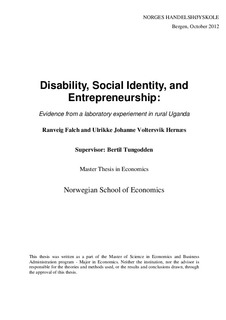| dc.description.abstract | People with disabilities (PWDs) often face social exclusion due to the stigma associated with
having a disability. This results in many PWDs being disadvantaged economically, in
education attainment and career opportunities. Entrepreneurship has come to be considered
an important tool in poverty alleviation and increased empowerment of PWDs, but the
prejudice they encounter creates barriers. In this thesis we present a laboratory experiment
investigating the psychological barriers among young PWDs to entrepreneurship in rural
Uganda. The participants are mainly secondary school students about to make decisions in
terms of their future occupations. Youth unemployment rates are high, indicating that many
need to become self-employed out of necessity to provide for themselves and their families.
Using priming as a tool, we make social identities salient. Social identity suggests
behavioural guidelines for people. We identify the marginal effects of social norms on
PWDs in terms of five major entrepreneurial characteristics: risk and time preferences,
willingness to compete, performance under pressure and self-efficacy. In addition, we
explore the negative stereotypes PWDs face in their community. We find no significant
priming effect on any of the characteristics, suggesting there are no disability-specific social
norms related to these entrepreneurial characteristics among PWDs. We do not find that non-
PWDs have negative stereotypes with regards to the abilities of PWDs, but the evidence
suggests that PWDs perceive themselves as inferior. Our findings are encouraging in terms
of policy implementation, as the results suggest that PWDs do not need specific targeting
when promoting entrepreneurship. | no_NO |
